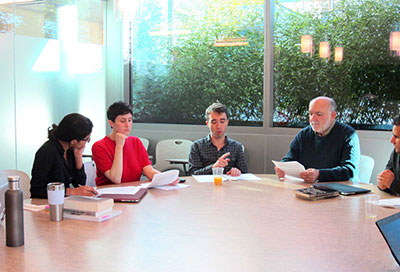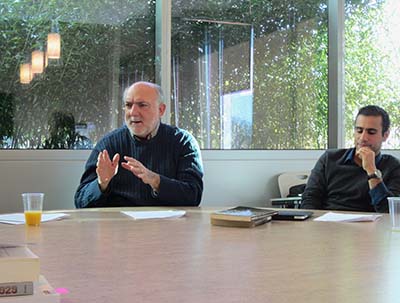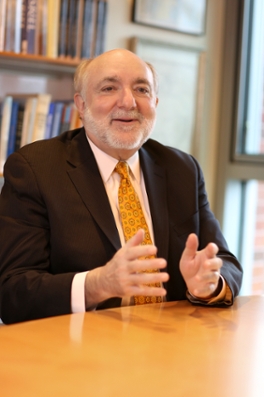A Tale of Two Judaisms
Diverse Readings in the Tradition of Religious Zionism
by Professor David Ellenson
January 6, 2017
2017 marks the centennial of the Balfour Declaration. In words that have reverberated throughout the last century, British Foreign Secretary Lord Arthur James Balfour wrote to Lord Rothschild, in the opening words of the second paragraph, “His Majesty’s Government view with favour the establishment in Palestine of a national home for the Jewish people.” He further requested that Lord Rothschild “bring this declaration to the knowledge of the Zionist Federation.” This momentous document spoke directly to “Zionist aspirations” to construct a Jewish state in the ancestral homeland of the Jewish people, Eretz Yisrael.

Of course, neither Lord Balfour nor the Zionist movement could foresee in 1917 all the glory and conflict that lay ahead as the State of Israel would come to be established. Nor did Lord Balfour and the Zionist leaders of that day – or the actual founding fathers of Medinat Yisrael in 1948 – ever define precisely what the Jewish character of the State would be. Indeed, debate over that character remains unsettled to the present day.
Debate in the Zionist Religious Community
Recent research at the Schusterman Center points to elements of that debate in the Zionist religious community which have significant policy implications for Israel today. Two distinct camps have read Jewish tradition so as to present two very different visions of how Judaism ought to guide the relationship between Jews and Palestinian Arabs within the State, and the polarity separating these two readings of Jewish tradition could not be more pronounced.
One stance has recently been advanced by contemporary rabbis in the State of Israel, while the other was articulated by a leading Orthodox religious Zionist in direct response to the Balfour Declaration nearly a century ago.
Arguing for Jewish Dominance
On the one hand, Rabbi Yitzhak Shapira and Rabbi Yosef Eltizur of Yeshivat Od Yosef Chai in Yitzhar in the West Bank provide an extremist reading of Judaism in arguing for Jewish dominance and aggression towards non-Jews in the State. Brandeis Near Eastern and Judaic Studies doctoral student Bar Guzi has pointed this out in a recent seminar paper on their 2009 book, Torat Ha-Melekh: Berure Halakhah Be’-inyene Malkhut U-Milhamot (The King’s Torah: Legal Jewish Clarifications Regarding Matters of Kingdom and Wars). Shapira and Eltziur are students of the controversial founder of Yeshivat Od Yosef Chai, Rabbi Yitzchak Ginsburgh, who gave his formal consent to the publication of their work and approved its content.
Shapira and Eltziur conclude that the life of the Jew is superior to the life of the non-Jew and they argue, as Guzi has shown, that “there is a consensus among the halakhic sources that it is permitted to kill non-Jewish [innocents] in order to save the life of Jews.” Guzi cites them as saying, “There are situations in which we would want, deliberately, to harm specifically those who are innocent, i.e., young children of the evil king’s family. Though they are now innocent, killing them helps us hurt him so that he will stop fighting against us.”
Bar Guzi, Doctoral Student, Highlights the Implications

Guzi goes on to show that the authors’ focus on young children does not end there. These rabbis conclude that “there is a svara (logical legal opinion) for harming young children if it is clear that they will grow up to harm us, and in such cases we should aim our destruction specifically towards them.” Given their assumption that it is likely that such children will inflict injury on the Jewish people in the future, Shapira and Eltziur conclude, in opposition to Jewish law as interpreted throughout the millennia, that “it is better to kill them now.” In the last part of the book, the authors even claim that “in order to achieve victory over evil, we must behave with them [the enemies] according to the way of vengeance and of an eye for an eye.” Their reasoning is that “revenge is necessary to make evil unprofitable and to empower the righteous.”
One need not be an expert on Jewish law in order to note the frightening and horrific implications of this work. Its practical effect is to call for vigilante actions on the part of Jews against Palestinian Arabs. It is therefore hardly unsurprising that Shapira and Elitzur were arrested by the Israeli police following the publication of Torat Ha-Melekh on charges of incitement and publication of racist materials, though ultimately neither of the rabbis was indicted.
"Justice, Righteousness, and Impartiality" for All its Citizens – Hirschensohn
In contrast to Torat Ha-Melekh stand the views that Rabbi Haim Hirschensohn (1847-1935) put forth in his Jewish legal work, Malki Bakodesh (My King, in Holiness), written one year after the Balfour Declaration in response to the 21st American Zionist Conference held in Pittsburgh in 1918. The conference, chaired by Justice Louis Brandeis, proposed that the future Jewish State, like the United States, be founded on the principles of democracy. One plank in the platform called specifically “for political and civil equality irrespective of race, sex, or faith of all the inhabitants of the land.” Rabbi Hirschensohn, a native of Safed who moved to Hoboken, New Jersey, in 1904, believed that the moment demanded an Orthodox response.
I analyzed Rabbi Hirschensohn’s position at great length in the Robert and Florence Dreben Lecture on Jewish Law this past September, co-sponsored by the Harvard Center for Jewish Studies and the Julius-Rabinowitz Program on Jewish and Israeli Law at Harvard Law School. The complete lecture will be printed in American Jewish History this summer.
Rabbi Hirschensohn asserted, in complete contrast to the views put forth by the rabbis of Yeshivat Od Yosef Chai, that the new political regime had to be a democratic one which rested its legislative authority on the will of all its people. He maintained that Jewish law mandated a democratic legal system invested with power by public consent and conducted in accord with “justice, righteousness, and impartiality” for all its citizens. Hirschensohn concluded his argument by proclaiming, “Democratic conduct like this, that is, a republican form of government with direct elections in which everyone enjoys equal rights in accordance with the highest standards of advanced civilization, will be the form of government in Israel.”
In an age where a Torat Ha-Melekh appears, the writings of Rabbi Hirschensohn shine out as a beacon to persons seeking a “usable Jewish past” to guide their deliberations about the Jewish state today. It is my hope that they will receive the wider attention they deserve and provide needed guidance to the State of Israel in these days of turmoil and discord.

Professor David Ellenson is the director of the Schusterman Center for Israel Studies and a visiting professor in the department of Near Eastern and Judaic Studies at Brandeis University. He is Chancellor Emeritus of Hebrew Union College–Jewish Institute of Religion.
More from Winter 2017 newsletter